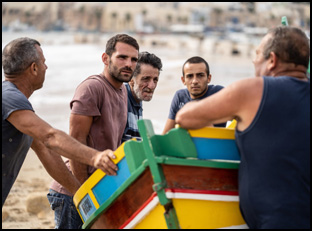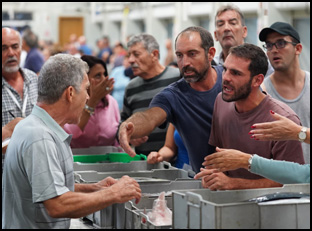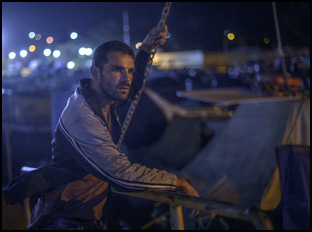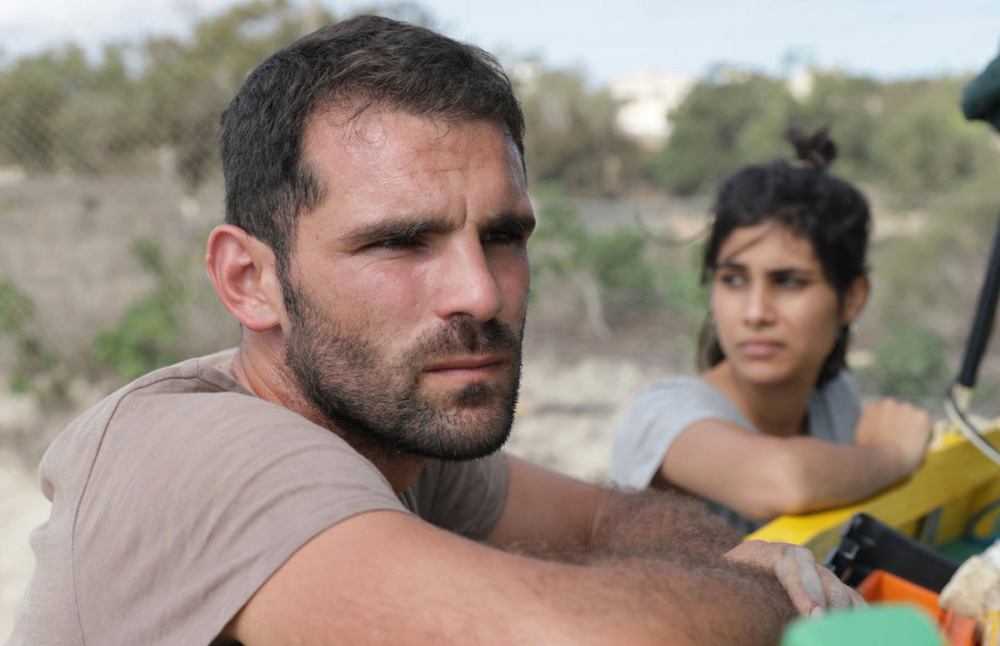As beautiful as any place on earth, sitting in the Mediterranean Sea, Malta has long lured filmmakers from around the world to its shores, playing host to Robert Altman’s production of “Popeye,” which has its set still standing as a tourist attraction to this day, and “Troy,” where Brad Pitt surely took note of the ample sunlight that made him look like a Grecian god when he was later looking for a setting subsequently for “World War Z.” Alex Camilleri had also taken notice when growing up in America, though it was through the lens of having parents that were from the country, and while he could often see Malta on screen, it was never presented as Malta, but rather some mythical place or a stand-in for somewhere else.
The cinematic potential of the island is fully expressed in Camilleri’s bewitching debut “Luzzu,” but the writer/director was intent on showing the beauty of the people there as much as the topography, training his lens on Jesmark (Jesmark Scicluna), a fisherman and newly christened father who is struggling to get by when he’s pulling in less and less from his trips out to sea. There is the call of easy money, defying conservation efforts that require fishermen to throw back more endangered species such as swordfish that fetch higher prices on the black market, but Jesmark tries to keep things above board in all aspects of his life, keeping afloat the boat that he inherited from his parents and his parents had inherited from theirs though it surely requires some repairs.
That pressure alone is more than enough to “Luzzu” to become a compelling drama, particularly when its director, a protege of Ramin Bahrani (who serves as a producer on the film), draws his cast from the real working class of Malta and spent years sussing out a story he could tell that would reflect the local community. Having come up in the film industry as an editor, most notably on Rachel Israel’s “Keep the Change,” the Tribeca Film Fest award-winning romance between a pair with autism (played by nonprofessional actors), Camilleri is able to identify the small, authentic moments that convey so much about the spirit of the place he’s filming in but also shows a gift for getting the most out of his actors, especially Scicluna, a captivatingly stoic presence who appears to have been just waiting to be discovered by a film crew. With the film now arriving in theaters and virtual cinemas after its premiere at Sundance earlier this year where Scicluna picked up a Special Jury Prize for acting, the director and star of the film spoke about how they first met and the meticulous process of bringing “Luzzu” to life.

Jesmark Scicluna: On day one when we met, Alex said to us he was going back to the States and I thought it was all a joke, like he came, he would shoot a couple of scenes and he would just leave and we’d never hear from him again. But it all changed after two months when he returned back. He actually called and he was like, “Hey, would you like to talk about what we talked about two months ago?” And from there, it went from a joke to what you see now. [laughs]
Alex Camilleri: It’s such a critical moment in this film’s life and finding Jesmark and David, the other fisherman, really did feel like there’s some gods of cinema looking after us. After months of striking out, we were lucky to find them and that they were as magnetic as they are and the minute I pointed my small camcorder at them, the whole film clicked into place, so it gave me a confidence that we were on the right path. But also Jesmark and David could lead me in so many ways – about the technical aspects of fishing and to help me get to the emotional truth of this world. They really lived it and that lived experience really comes through in the film and you feel what they’re going through on a visceral level. That’s why you work with non-actors in the first place, to get beyond fiction, just something that’s going to break through the screen and really reach out and touch you.
Jesmark Scicluna: At first, I never thought it was going to be what it was. You have never done it, [with] this guy coming up to you and giving you the lead role. You’re not an actor, you’ve never acted, you’re just a fisherman. But when I got to see some of the rehearsal shots, it started to make sense what he was saying. From there, it changed quite a lot, and it affected me in a way that apart from delivering the act, you’re delivering your story and it started to feel something yours. We weren’t a director/actor relationship. It was a best friend relationship, so it became something ours.

Alex Camilleri: I’m glad you brought up “Keep the Change” and some of the editing work because I’ve often talked about editing as being the X-Ray of the film. It was my film school, so it was like I learned to make films backward, starting in post-production and then reverse-engineering how all the parts come together and seeing the potential of what can be done, especially with non-actors. To edit non-actor performances, or really any performance when you get that close to the footage itself, you tap into when is the performance really alive. It’s not always when the actor is doing the acting. Sometimes the actor might not know the camera’s running and they’re just being.
I would get such pleasure in my own editing in those moments when an actor is not even paying attention. They’re just breathing and it’s pure – they’re not thinking. That kind of performance is great, so I was able to do that in some of my past work and it gave me a philosophy going into this [where] obviously, Jesmark is in full control over what he’s doing in the film, but we just created an environment in which we could get past thinking. We didn’t set down marks and we didn’t work with a full script. That was all in an effort so that Jesmark and the other actors could be free and that we could get past that performance [where] it doesn’t feel like there’s a camera there, that this is reality and we just happen to be witnessing it.
Jesmark Scicluna: Alex gave us a good understanding of how things work. He told us, “You’re not going to understand the story while filming” because unless you know the place of each scene in the script, you’re not going to figure out what’s happening. So he would say, “Work on the scene we have and forget the rest.” And that really helped because you’re just taking it scene by scene. “Forget get the scene we shot before, and just focus on this one” and keeping that in mind, you could focus on whichever day or whatever time in the film it is. That really helped.
Jesmark, when this is where you live and your profession, were there things important for you to instill in the performance?
Jesmark Scicluna: When Alex gave us insight into the script, and he mentioned the swordfish scene, throwing it back in the sea [because of] the declining number of fish, that was all part of our reality, so the fact that he was going to show the real side of fishing rather than what we’re used to seeing — catching the fish, laughing, having fun — he really showed the struggle of a fisherman and the decisions that had to be made. In reality, just because you catch a fish, you don’t go find some black market and [sell] it, but maybe you take on a job, ask for favors, like “I’ll come do two or three days work with you and get some money.” When my cousin David, who was the other actor, and I got to know these scenes he’s going to include — and he really was determined to include them — it really gave us the courage to give our best because we are showing our real life. We’re showing literally the backside of how the fish is delivered to the clients and that really gave us the boost to do it as if it was just our own.

Alex Camilleri: Oh yeah, in so many ways and that’s why these films take a while to make. We were doing that combination of research and rehearsal for a couple years before we shot anything because I had to learn a lot about the world, just to get the understanding of what the fishermen are going through. I had to understand the broad strokes, but then for this film to come alive, you really had to get granular. There was no other way than but to spend time with the guys on the boat in the real locations and just absorb all the detail – things like Jesmark has oil stains on his arm and he gets them out by rubbing sand onto it and then dipping his arms into the sea. I wish I was a good enough writer to come up with that by myself, but luckily I had reality as my co-writer. Just sticking around long enough, I could just gather all that delicious detail and truthfully, there’s a million things we wish we could’ve put into the film that are amazing, but there’s just not enough time in a 90-minute film.
Shooting at that fish market looked like a wild day of filming.
Alex Camilleri: We were so proud of that, the whole crew. That was an amazing accomplishment because I would go to the fish market during my research because the auction happens at 4 a.m. and it lasts 20 or 30 minutes. There’s a mammoth amount of seafood that’s sold really, really quickly, so I had gone there and just shot a little documentary footage and wondered, “Well, how could we ever do it on our shoestring budget?” We just couldn’t recreate it on this scale. We couldn’t buy this amount of fish, so the only choice was to just do it for real. So we had the crew ready to shoot by 4 a.m. and there’s a 30-minute window when it’s going to happen and there’s all this coverage and there’s no going back. Everyone was so on their game and of course, with the fishermen in front of the camera, they knew this environment, they knew how to move through it. It’s an amazing sequence of such scale and intensity on a film that is of such modest means, [the fact] we got that to film is just extraordinary.

Jesmark Scicluna: It’s a nice feeling. You’ve promoted a lot of things which are your life. You’ve promoted fishing, you’ve promoted your country and you’ve promoted our language, which on screen isn’t really common. We don’t find Maltese films in the Maltese language going around the world and doing good, so it feels really awesome. It’s not just something that made me or my family feel proud, but I believe it made all the country proud and that’s really the biggest reward.
Alex Camilleri: It’s very humbling to take people to Malta for the first time and introduce the Maltese islands to many people who may not have even heard of the place. It’s an incredible privilege to be able to do that, and I wanted to make films my whole life, so it feels like it’s been a long time coming. Out of that struggle and the frustrations I had in my own life of having a dream and having the world push back on it and say no, maybe you can’t do it, which now feels a bit baked into the film, it’s really humbling to express something personal, but it touches people and the story comes alive inside of each viewer in such a different way. The fact that it’s people all over the world — the film is coming out of the United States right now, but we’ve sold it in over a dozen territories around the world, including China, Japan and Brazil – places very far away from Malta — it is just extraordinary to witness something that seems very universal.
“Luzzu” opens on October 15th in New York at the Quad Cinema and October 22nd in Los Angeles at the Laemmle Royal, the Pasadena Playhouse and the Encino Town Center 5. A full list of theaters and dates is here.




